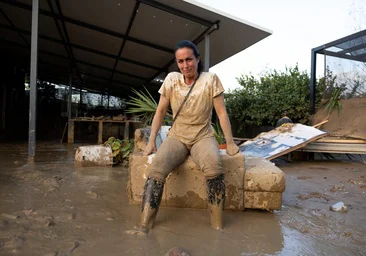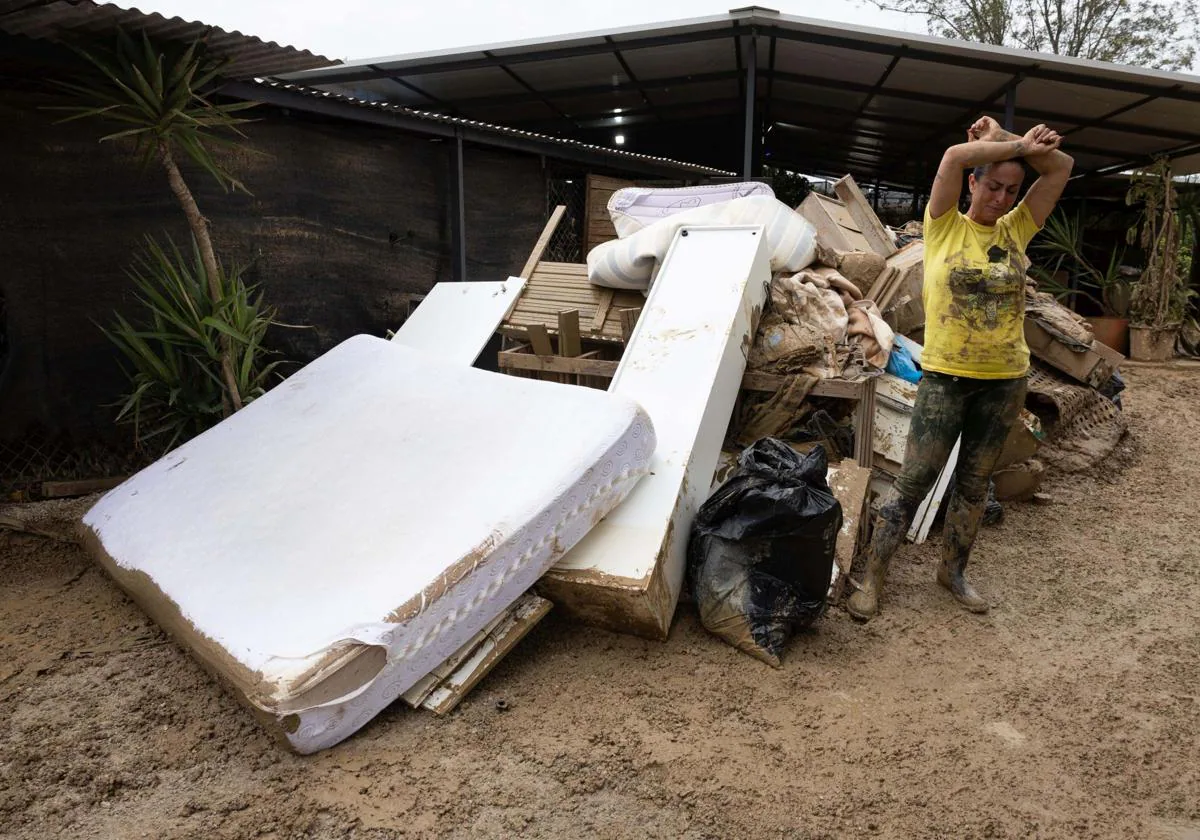Cloti, clawing her life back after the 'Dana' storm hit Malaga: 'At least I can now get into my house'
Friends, firefighters and volunteers have all chipped in to help this single mother who has lost everything and must now rebuild her home in the Guadalhorce valley
They come with shovels and buckets, safety helmets and wheelbarrows. Some bring only the will, others with whole toolboxes. Others come with bags of food and jugs of water, while one pulls out a voltage detector as he is an electrician. Most come in private cars to Cártama. In the background, there is a 4x4 marked with the orange colours of the civil protection organisation. Some of the firemen are on duty. Not all of them though, like Sergio, who is on a rest day. They have come to help Cloti.
Until two days ago, the world was a wasteland for Cloti. A single mother, 44 years old, a warrior, but evicted from her home by the ferocious 'Dana' storm that swept through southeastern Spain. She wandered around like a zombie.
When Clotilde de Luque is now asked how she feels, she is still pessimistic. What she has experienced is embedded in her brain, her ears, nostrils and mouth. In her feet, too. There is no longer anything firm between her boots and the ground, just slippery mud. But now she sees some light. "At least I can go into my house now," she said.
Every time she starts speaking, her lips tremble. Cloti's story appeared in the Diario SUR newspaper and on the SUR in English website, and with it all the machinery was set in motion. Not only the heavy machinery, such as the mechanical digger that removes huge boulders in the afternoon, those that prevented access to the plot and forced her to walk along the motorway crash barrier. There is also the fire brigade pump that drains the water. There is also the humanity of the volunteers, and the mayor of Cártama.
Seen in perspective, what works is the machinery of a society that still resists the stubborn selfishness that rots everything. "Where am I taking this?" asked Laura Priego. She is a student at Malaga University and has come to accompany her brother to help Cloti. "There, with the rest of the things," Cloti answers and points with her index finger to a mountain of rubble. The mattress, almost new, has had a very short life.
The mountain in question is both chaos and hope. Chaos because it reflects the enormous destruction of water and material loss. Hope, because two days ago, clearing all of this seemed unmanageable.
"When the entrance is clear, they'll send me a skip and we can start throwing things out. That's what I've been told," said Cloti. She is wearing a mud-splattered yellow T-shirt, wellies and her hair is still shaggy. But something has changed in her eyes. They are not absent or dull, they are focused and not perplexed. When she walks, she walks with a certain speed, as if she is in a hurry to get back to the way things were.
Because Cloti's story is still not a happy one, after a while, tears appear on her face. She sobs and lights a cigarette. She inhales and exhales. "I worry about feeling sorry for myself, feeling that I'm getting more help than people who are in a similar situation to me. There are so many of us," she says.
It is true that personal dramas tend to be relativised in a disaster. Cloti, however, has plenty of arguments for help. Divorced, she invested all her savings in a house that is no longer a house. "After the separation, my reality changed. In Malaga, I couldn't find anything I could afford on my salary. Here, in Cártama, I was able to build this home so that I could have shared custody," she said. Cloti's daughter Daniela is now ten years old.
The work that remains to be done seems endless. From where the porch of the house used to be, a surreal panorama is revealed. Cloti's house is a skeleton of concrete and panels. There is accumulated rubbish in the living room, the garden is a swamp and the walls are painted with mud. To speak of an improved situation if you don't know the before may seem audacious. But the before was the set of a horror movie. Branches, unusable electrical appliances and mud, infinitely much mud. "Now you can see some colour," she said.
Urgency
Cloti and Daniela are staying at her sister's house, but it weighs on her that her daughter is beginning to notice the absence of their home. "She asks me where her things are and that's very hard," she said.
"I have to do it. I have no choice, for my daughter's sake," she said. Cloti has had to start from scratch but she doesn't want to be a victim. She prefers to look to the future, even if it is still hard. It is already 6pm and it is getting dark, but volunteers and firemen are still clearing mud. From above, the scene is reminiscent of a hamster wheel in which the movements are always repeated: Remove mud and remove more mud.
There is a wall at the back of the house with a sign on it. On Tuesday it was still unreadable. It is a word in English: "Home". It sounds corny but in the present circumstances who knows, there may be hope for Cloti.




Comentar es una ventaja exclusiva para registrados
¿Ya eres registrado?
Inicia sesiónNecesitas ser suscriptor para poder votar.